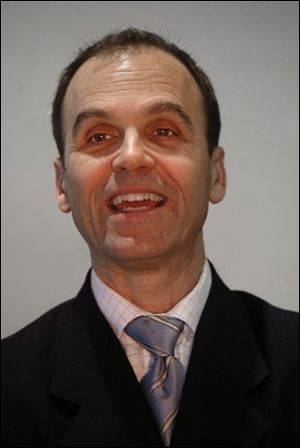
Novelist-attorney struggles with death penalty
3/3/2004
Turow: He is the author of six legal mysteries.
It may not be hard to rationalize execution for a serial killer as heinous as John Wayne Gacy, convicted in 1980 of luring 33 young men to his home and torturing them to death.
The death penalty is one of those polarizing issues that seems to pit “bleeding-heart liberals” against “barbarians,” said author Scott Turow.
But most people share some common ground on the subject. “We can all agree that life is sacred. And there has to be just punishment for severe crimes,” Turow told about 300 people at last night s Authors! Authors! lecture at the Great Hall of the Stranahan Theater. “I don t criticize anybody s views about the death penalty because during my life time, I have held them all.”
A Chicago attorney and author of six legal mysteries, Turow knows there are people so maimed by nature or circumstance that their lives have no redeeming value. At one time, he was so unsure of his beliefs, he declared himself “a death-penalty agnostic.”
But he was destined to confront it. As an attorney doing pro bono work, he represented men on death row. He served on a governor s commission examining the death penalty in Illinois. And he undertook a novel, Reversible Errors, about the subject.
“I asked myself on a daily basis, what is this for? What do we hope to get out of it?” said Turow, 54. “I hoped this subject could be discussed in a less strident way than it had been.”
He considered arguments for the death penalty: that it s a deterrent to crime, but found that was untrue; that it saves money, but he learned capital punishment costs about 30 percent more than keeping someone imprisoned for life, largely because of the legal costs; that it will prevent murderers from killing again, but found that to hold true in about one in 100 cases.
The strongest argument for a death sentence he heard was that the victims deserve it to avenge their deaths. But the death sentence, he said, is applied in only one of every 50 first-degree murder convictions. “Are we saying the victim doesn t deserve it in the other cases?”
Moreover, lots of circumstantial factors determine whether a death sentence is imposed, such as the desire of a prosecutor or the police. Or a defendant may have the wrong lawyer. “And far, far too often, it s because the defendant is poor,” he said. “There ain t no rich men on death row.”
People want ultimate punishment for an ultimate evil, but he concluded that is fantasy. It cannot be made completely fair or foolproof.
Males are sentenced to death at greater rates than females. Cases in which the victims were white are more likely to result in a death sentence than if victims were black. Sometimes it may be the surly belligerence of a defendant that irritates officials into calling for death.
“When you have a death penalty, sooner or later you will execute the innocent,” he said.
Law, alone, cannot restore the world. “That will only come from the way we deal with and love one another.”
The Authors! Authors! Series is sponsored by The Blade and the Toledo-Lucas County Public Library.